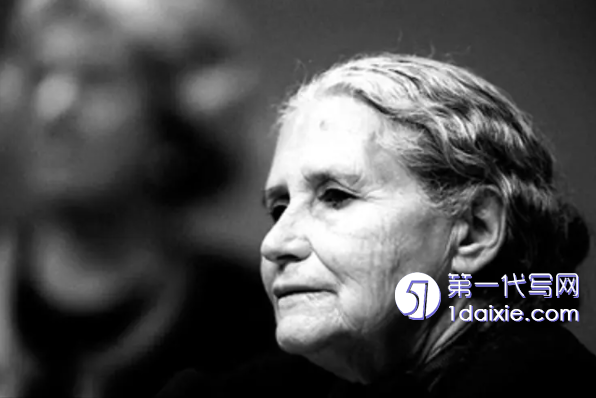本文是一篇英语论文,本文借助克里斯蒂娃的“过程中的主体”这一理论分析女主人公如何用身体话语抵抗男权束缚,利用发型、穿着打扮内化、对抗以致消解占主导地位的男性主体性。
Chapter One The Crisis of Female Subjectivity
1.1 Limited choice in home space
Kate’s experiences forged a “link between representation and self-representation” of the silenced stereotypical mother and wife (Robinson 13). For her family’s physical, spiritual, and to some extent, moral needs, Kate has consistently been an angel in her house. Kate believes that stereotypical attitudes regarding crucial experiences and the inaccurate terminology used to describe them imperil her personal feelings (Robinson 13). Kate Brown admits the contrast between her actual experience and the words used to convey the stereotypical sentiments created by social conventions at the beginning of the novel. According to Kristeva, language denigrates women and refuses to accurately portray them in patriarchal societies. Kate Brown accepts the standardized sentiments conveyed by the common phrases in the novel.
She was trying to catch hold of something, or to lay it bare so that she could look and define; for some time now she had been ‘trying on’ ideas like so many dresses off a rack. She was letting words and phrases as worn as nursery rhymes slide around her tongue: for towards the crucial experiences custom allots certain attitudes, and they are pretty stereotyped. [……] Of course, the choice of one rather than another of these time-honoured phrases has seldom to do with a personal feeling… (Lessing 1).

1.2 Maternal extension at workplace
Emily Jeremiah notes that maternal writing “entails a publicizing of maternal experience, and it subverts the traditional notion of mother as an instinctual, purely corporeal being” (Podnieks & O’Reilly, 5) In The Summer Before the Dark, Kate’s motherhood, though often an emotionally draining task, extends not only to her children but also to Global Food, where she mothers the international delegates, and to her lover Jeffery on the journey to Spain.
As Kate accepts Alan Post’s offer to work as a translator for Global Food, she experiences what she describes as a very chilly wind that has begun to blow directly towards her from the future. She leaves the house alone for the first time since getting married. Home is her center, and leaving it is like losing all of her mental strength. But as a multi-lingual translator, Kate is doing her work perfectly and smoothly. During the proceedings, just a few moments of panic filled her mind, but through watching the faces of the listeners, everything went quite well. “The second week was less pressured. Her work had become something she did as easily as she had run a home—unbelievably, only a few days ago. She did it automatically” (Lessing 26). While mastering of translator work, Kate has time enjoy coffee time, letting her words or feelings that represented her personal thoughts flow through her mind. Gradually, instead of being new comer, Kate is involved in this big family with her maternity. “She was stopped increasingly often for advice and information. Where to buy this or that face cream; or that special foodstuff; how to find the restaurant, the hotel, a dress shop, or the right place for British woolen goods or whisky” (Lessing 27). Kate’s role at work shifts from newcomer to veteran in a matter of days. It demonstrates that Kate’s character’s training as a mother is so deeply ingrained that, for the time being, it appears to have become the major aspect of her character, her very being.
Chapter Two The Dilemma of Female Subjectivity
2.1 A passionate lover of Jeffery
Lessing has stated that an individuating personality must learn to look beyond the surface of things in order to discover “who and what one was before the external and internal authorities got ahold of him” (Cederstrom 137). Kate Brown sees both the inner and outer world, the ego and the self, with the same lack of depth. Lessing is, of course, asserting that one must have the time and opportunity to explore the sense of self behind the social façades even if that sense of self is not socially acceptable and requires an excursion into madness or involves hostile and anti-social attitudes. Kate Brown anticipates and fears this kind of introspection: “She was going to have to return to London, to be alone somewhere for two months, and to look in solitude, at her life” (56). While Kate feels this to be a necessity, she is readily diverted from the pain of genuine introspection when the opportunity for a sexual liaison arises. Jeffrey offers Kate a diversion—a trip in which she will function as half of a couple; she readily and humorously accepts this comfortable role because it offers no challenges. However, Jeffrey and Kate’s trip together is a journey into sterility.
For the “non-loving lovers” of Kate and Jeffery, they have little in common. Jeffery has little reality other than his social façade. He appears exactly at the time Kate has decided to stay alone in the next few days. While their attraction to each other has little motivation, which is Jeffery wants a woman to accompany and Kate has to confront the challenge in her journey. Jeffery is a stereotype, and Kate falls immediately into regressive patterns as he pours his trite history—trying to find himself—into the ears of the “skilled listener,” Kate. She drifts into this role and this kind of relationship for the same reason that she has drifted into every other one: because it is easier than asserting a sense of self that must be met.
2.2 The dream cycle of Kate
However, the significance of Kate’s return to Blackheath needs to be considered not only in terms of her conscious actions but also in terms of the underlying mechanisms present within the dream cycle; one must look not only at the surface events but also at the threads woven into their reverse side, both their specific essence and the pattern in which they set up the overt narrative events. Kate is not truly released by the tension between her beliefs and reality; instead, she is left feeling conflicted and uncertain about her choices. Kate aspires to break free from the typical role of a housewife, but she exhibits a variety of hesitations as she adjusts to her new profession and her disappointing and unsuccessful sexual encounter. She is unsure of how to approach the issues she faces right away, but she receives indications through her dreams to express her uncertainty. Lessing uses the sorrow and suffering of the seal in the dream to represent Kate’s ambivalence in the actual encounter rather than explicitly expressing it. It is clear from the thorough examination of Kate’s seal dreams and her current circumstances that the explicit meaning of her dreams is actually a cue to her in her quest for freedom, and that understanding the hidden meaning of her dreams is an understanding of her true psychological state.
Chapter Three A Quest for Female Subjectivity Construction ................. 44
3.1 Identity transmutation: not caring but being cared of ...................... 44
3.2 Subject in process ......................... 54
Conclusion ................................... 65
Chapter Three A Quest for Female Subjectivity Construction
3.1 Identity transmutation: not caring but being cared of
As a diligent wife and mother for the past 15 years, Kate now realizes her subordination to her family. Many political feminists support the idea that women should have their own subjectivity rather than having their relational selves subordinate to men during the women’s liberation struggle. Beauvoir in The Second Sex argues, “[W]omen form an integral part of the group, which is governed by males and in which they have a subordinate place” (Beauvoir 608). In the novel, Kate agrees to accept the job as a translator no matter how much she dislikes it; with sympathy and warmth, she chooses to endure it for her husband’s benefit. Before the dark of this summer, Kate understood that she constantly provided service to her family and to her colleagues through her passivity and adaptability toward others (Lessing 17). In spite of her own sentiments and interests, she consistently meets others’ needs and requests and extends comfort, kindness, and care. In her own words, she thus becomes “a wounded bird, being pecked to death by the healthy birds. Or like an animal teased by cruel children” (Lessing 91). The illustration of a dangerous bird being killed by healthy birds is analogous to her predicament, in which she has completely lost her sense of identity and is subject to the desires and needs of others.
Kate’s introspective voyage takes her back to London, to a hotel room in Bloomsbury where she opts out by allowing herself become ill and enjoy the feeling of eing cared of. Actually, it is the place where Kate is in the position of caring about others. And this is the place of Kate’s transgression of the familiar border that Kate Brown makes in this part of journey. And from now on, she attempts to rebuild her subjectivity after recognizing that she has lost her sense of self. Kate’s constitution subjectivity takes place in the hotel and in Maureen’s house.

Conclusion
The Summer Before the Dark originally published in 1987, and its historical backdrop reflects the author’s feminist awareness, which is undoubtedly reflected in the novel. The Summer Before the Dark is less gloomy since it has provided Kate, the female heroine, with a promising future, moving away from the tragic conclusion Doris Lessing’s early female characters would experience. She initially resorts to running away from her unworthy self, pursues acceptance into society, exacts retribution by creating her personal matriarchal kingdom, and finally returns to her starting position with such a genuine shift of perspective.
The thesis has been an attempt to delineate the interaction between confinement and construction of female subjectivity in Doris Lessing’s The Summer Before the Dark, explaining how the heroine Kate, confined and constrained by patriarchal society, seek to resist male dominance and lead to a fundamental shift. According to earlier research, Kate remains a victim of the patriarchal system even after she returns home. And she continues to be a lost mother and wife. But what is frequently overlooked is how complex and flexible female subjectivity is. Thus, this thesis provides a more detailed discussion of subject-in-process, through resistance to the stereotypes of woman, deconstruction of patriarchal discourse, the modification to dress and hairstyle under the oppression and dilemma subjectivity situations.
reference(omitted)
